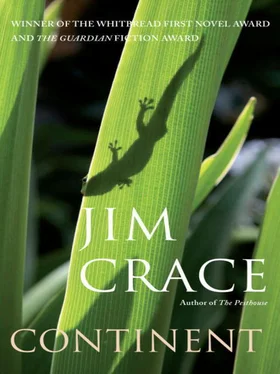‘The Professor’s interest in the unrecorded smaller species in which the forest abounded was abandoned,’ said mother. ‘He postponed our return home for a further six weeks. He was determined to witness the communal birth for himself. I was left relatively unpestered in the charge of a girl whom the Professor nicknamed Puppy, because she could pronounce the word. She was, perhaps, a month or so too young for pregnancy, poor thing. She was quite happy to collect and cook our food and, indeed, to wear the dresses which I loaned her. I could not have her naked at our table. I taught her cat’s cradle and hopscotch. It was foolish, perhaps. But she was sweet — an awkward, bony little thing — and I was bored beyond endurance. I had no tasks, and though the Professor and his trapper were huddled in conversation and much laughter until late at night, I was excluded. Except from Puppy.’
In the meantime — and with the trapper’s vabap-vabap at his shoulder — my father busied himself with monitoring the pregnancies and with keeping a journal. We start with the notion of menstrual synchrony’, he wrote. ‘It is well established amongst the women of even the most civilized households throughout the world. The monthly cycles of women in close and regular physical proximity harmonize and correspond. They run in parallel. They ovulate simultaneously. The aetiology of such a phenomenon is not established, though olfactory and glandular agencies are most likely. Nature is neither wasteful nor gratuitous. The mechanism for reproductive synchrony is latent in humankind. We must take this as evidence that such a mechanism was at one time fully active as confidently as we must presume an ancient tail implicit in our own vestigial coccyx or a full pelt of hair as ancestral to those few strategic tufts which still endure. Any synchrony of sexual intercourse, pregnancy and birth amongst the forest people, a community otherwise free of profligacy or baser passions, suggests a practice too fettered and precise to bear an anthropological interpretation of custom or taboo. Here, cut off from humankind for centuries beyond number, is a species whose reproductive natures are as different from our own as a gibbon’s from a chimp’s. Are we to witness a mass human parturition as brief and ordered in duration as that observed by shepherds amongst their sheep? Is this the natural, primitive pattern of human reproduction from which our own sexual connivance has evolved and which was thought lost amongst the orchards of what the Christians label Eden?’
‘IT WAS a wearying experience,’ said mother. ‘As you would expect, the men made all the noise, with their own backache and sickness and their stomachs distended with phantom offspring. The women were silent and out of sight, of course.’ Her recollections were bitter and, perhaps, distorted too. She described a village barmy with pregnancy. And then one morning the men went off into the forest to give mimed birth to the stones which they decorated or to the wooden dolls which they had carved. And in the shelters of the village the first curious skirlings of the babies began. It was an orphan chorus of human gulls, she said, the clutter rather than the mystery of birth. ‘The Professor, of course, was not welcome at that time with his calipers, camera and notebook. Nor would they accept assistance from me, though my presence, with Puppy at my side, was at least ignored. The births themselves seemed relatively easy; labour was short — as if the stones and dolls now produced by their men had freed the women from a punishing confinement. Or so your father said. For myself I have never discovered the attraction of small babies. And here were two hundred or so, pupped like seals within three days.’
How many survived? How many bore healthy offspring? Some were stillborn, cordulated or drowned. Others perished within minutes or hours or days. The unlucky mothers — children some of them, a month or so older than Puppy; in a kinder world they would have been schoolgirls — ruptured or haemorrhaged. For some the placenta tore and there was bleeding, pain and slow death. But for every bereaved mother there was an orphan child to suckle. ‘Left to its own devices, nature is cruel but tidy,’ my father noted. And once the men had returned and the waste had been buried and the dead separated from the living, the forest people went back to their business, as gentle and as calm and as casual as sheep without rams.
My father whispered his proposition to mother in the darkness of their bedding — that they had encountered humankind in its sexual infancy, that the forest people were specialists in the brief encounter, like that observed amongst bullfrogs, hammer-headed bats, kakapo parrots and the mass aerial dance of mosquitoes. And, of course, his dreadful legions of tiger crabs. ‘Where is the evidence?’ my mother asked him, dutifully displaying the cynicism on which he as her teacher had insisted. ‘All you have is a host of shared birthdays and the four-year-old gossip of a trapper. His testimony might not impress a scientific seminar in quite the way you hope.’ ‘We will gather evidence,’ he said. ‘How?’ My father patiently listed the rituals and procedures of scientific field study to his bride, his student. ‘And for this, of course,’ he said, ‘a cadaver is required.’
In his journal, he wrote: ‘The estrus cycle or period of “heat” during which female mammals are receptive to males is, if Elgie’s work is to be accepted at face value, controlled by the ovarian cocoon. Follicles secrete a natural scent to advertise readiness and availability and, also, to trigger a sexual response in the males. Is this the secret of the forest women, simply an enlarged cocoon inactive, except occasionally and communally, once a year or less? Are the odours of chemistry still as eloquent here as amongst bears and antelope, while we — our estrus lost as surely as our tails — enjoy our tamed and liberated embraces, triggered by our hearts and not our tyrant vesicles, free and equal, donors and recipients of physical affection?
‘What of their men? It is evident that the testes of the forest males are considerably enlarged. Measurements of my own testes and those of the reluctant trapper, who is now employed as my assistant and interpreter, compare unfavourably with those of the two young males who quite amicably allowed us to take calipers to their private parts. I estimate a size difference in an approximate ratio of five to three. What can be the function of the larger testicle other than the enhanced production of sperm and the increased power of impregnation necessary for the precise and efficient service of females who are sexually receptive for a short period only? I become more convinced that my hypothesis will sustain closer scientific analysis. If I were dealing with one of the lower primates, I would instruct my trapper to shoot some specimens. The matters of genital volume and weight, of sacs, cocoons and vesicles, could then be readily established with scalpel and scales. But here we are dealing with humankind — in almost every detail of surface anatomy, proportion and pigmentation identical to myself and my dear wife. But what are the subcutaneous secrets of these people? Only surgery and autopsy can provide the answers. What will the knife reveal?’
THE TRAPPER’S ‘forest’ was not equal to the task. He could flap his plosives in simple barter or requests for food. But no words, he said, in this or any language were adequate for what my father was now demanding. Sixteen women, a dozen or so foetuses, had died in birth. Their bodies were lying in a shelter under damp leaves. Soon, unless they were burned or buried, their flesh would putrefy, provide nesting sites for swag-flies or lunch for termites. ‘Tell them I want one female adult,’ said father. ‘And a male infant. And a male of reproductive age, if at all possible. I’ll pay. Can you explain the urgency, that flesh rots, that I am a scientist, a wise man?’
Читать дальше












